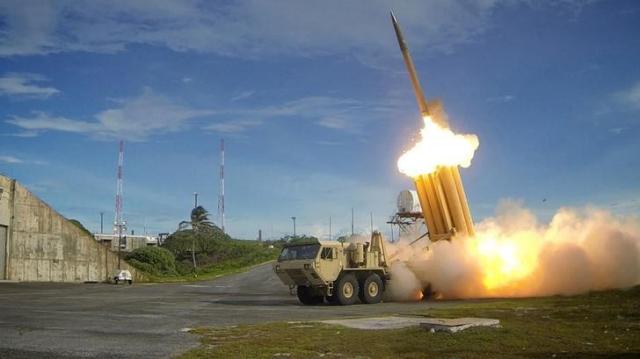Media Report

- Foreign Policy comments: "China has begun increasingly relying on economic coercion — much in the same way the United States has in the last two decades — to pressure its neighbors and threaten U.S. interests in the Pacific. For example, in response to the prospective deployment of the United States' Terminal High Altitude Area Defense (THAAD) missile system in South Korea — designed to protect a U.S. ally from North Korea — China has limited commercial flights to and from South Korea as a way to increase economic pressure on Seoul and signal its displeasure with the planned deployment...But China's use of economic coercion — and the threats it may pose to U.S. interests — is not limited to sanctions-like measures that prevent access to Chinese markets. In recent years, Chinese direct investment into the United States has increased significantly, and while the vast majority of this investment is innocuous and ultimately a boon to the U.S. economy, there are reasons to be concerned...After years of the United States developing its own tools of economic coercion, it's time to pay more attention to defense."
- Reuters reports: "China's Foreign Ministry said on Wednesday it wanted to work with the international community to fight Uighur militants, following the purported release by Islamic State of a video showing Uighur fighters in training...The Iraqi unit of Islamic State has released a half-hour long video purportedly showing Uighurs training, as well as some images from inside Xinjiang, including Chinese police on the streets. One shot shows Chinese President Xi Jinping that gives way to flames in front of a Chinese flag...Chinese Foreign Ministry spokesman Geng Shuang said he was not aware of the video and had not seen it. 'But one point is very clear. We oppose any form of terrorism and proactively participate in international cooperation to crack down on terrorism,' he told a daily news briefing. 'We have long said that East Turkestan forces are a serious threat to China's security and we are willing to work with the international community to jointly crack down on East Turkestan separatist and terrorist forces,' Geng said."
- Al Jazeera reports: "Russia and China have vetoed a UN Security Council resolution backed by Western powers that would have imposed sanctions on Syria over the alleged use of chemical weapons by the government of President Bashar al-Assad. Drafted by Britain, France and the United States, the measure on Tuesday won nine votes in favour, while three countries - China, Russia and Bolivia - opposed it...The proposal marked the first major Security Council action by the new US administration under President Donald Trump, which is seeking warmer ties with Russia. 'This resolution is very appropriate,' US Ambassador to the UN Nikki Haley told the Council after the measure was defeated in the vote. 'It is a sad day on the Security Council when members start making excuses for other member states killing their own people.' 'The world is definitely a more dangerous place,' she said, criticising the vetoes as 'abominable and indefensible choices'. Commenting on Haley's choice of words, Marwan Bishara, Al Jazeera's senior political analyst, pointed out that one could not differentiate between the US ambassador under ex-President Barack Obama and the current US envoy to the UN under the Trump administration. 'In Washington, they don't know what's their policy in the Middle East,' he said, adding that the US strategy in the region was not articulated. 'At the end of the day, everyone is reflecting their own core geopolitical calculus.' "
Calendar
- 2017-02-28 'The president always gets something': Spicer suggests Trump gained concession from China
- 2017-02-27 1st senior Chinese official visits Washington in Trump era
- 2017-02-26 For More Chinese Firms, It Pays to Make It in the USA
- 2017-02-24 China hits back at Donald Trump's 'champion of currency manipulation' jibe
- 2017-02-23 As China Ups Heat on NKorea, US Faces Questions
- 2017-02-22 Exclusive: China finishing South China Sea buildings that could house missiles - U.S. officials
- 2017-02-21 Chinese premier appeals to Washington to avoid ‘trade war’
- 2017-02-20 Chinese Bank Cleanup Plan Could Leave a Mess
- 2017-02-19 US carrier starts 'routine' patrols in South China Sea
- 2017-02-17 Tillerson Urges China to Confront North Korean Provocations
News
- Reuters China calls for cooperation to fight Uighur militants after video released
- Al Jazeera Russia and China veto UN resolution on Syria sanctions
- Reuters China February factory growth beats expectations as global demand improves
- Bloomberg China Said to Order Steel, Aluminum Curbs to Fight Pollution
- The Associated Press The Latest: China rejects Trump claim it took US jobs away
- Bloomberg One Startup Builds $1 Billion Business Out of 15-Cent Bike Rides
- CNN Money Trump promises more coal and steel jobs. China is cutting 500,000
- The Financial Times China economic strength allows shift from stimulus
- The Wall Street Journal China Economy Draws More Students Back From Abroad
- The Associated Press Minister: China to cut 500,000 heavy industry jobs
- The Telegraph China considers financial "rewards" for second child after baby boom fails to materialise
- The Financial Times Fund managers wary of Chinese stocks
- BBC Chinese Super League outspends Premier League as winter transfer window closes
Commentary
- Foreign Policy Economic Coercion, with a Chinese Twist
- China File Back to the Jungle?
- The Wall Street Journal Corruption Currents: Russia, China Block Additional Syria Sanctions
- Quartz China isn't displacing traditional aid donors in Africa
- The Diplomat Morocco: China's Gateway to Africa?
- Fortune Xiaomi's New Processor Won't Save Its Smartphone Business
- The National Interest Beijing at Sea: Is China Crafting an Atlantic Maritime Strategy?
